
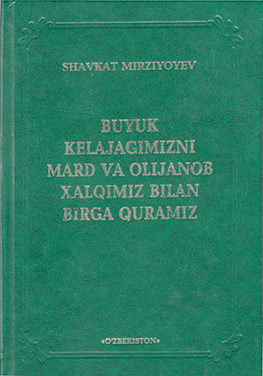
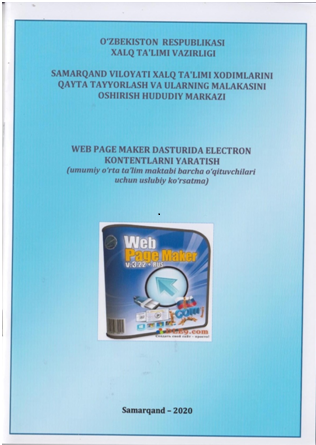 Ushbu usluby ko`rsatma Wep page maker dasturi yordamida veb-sahifa yaratuvchisi sayt dizayni va rivojlanishi uchun imkoniyatlarini yaratadi. Nazariy ma'lumotlarga qo‘shimcha ravishda, Web Page Maker dan foydalangan holda sayt yaratishga misol keltirilgan. Internet texnologiyalari shiddat bilan rivojalnayotgan dunyodagi eng katta kompyuter tarmog'idir. Veb sayt foydalanuvchilari zamonaviy dizaynga ega, grafika va animatsiya bilan ortiqcha yuklanmagan, tez yuklab olinadigan va veb-brauzer oynasida to‘g'ri ko‘rsatilgan veb-sahifalardan foydalanishlari mumkin. Multimedia texnologiyalarini qo‘llab-quvvatlaydigan veb-sahifalar har xil ma'lumotlarni birlashtiradi: matn, grafika, ovoz, animatsiya va video. Muayyan veb-sahifa qanchalik yaxshi va chiroyli tarzda yaratilganligi uning Internetdagi muvaffaqiyatiga bog'liq. Ta'lim muassasalari uchun veb-saytlarni yaratish va ta'lim tizimida Internet texnologiyalaridan foydalanish muammosi dolzarb bo‘lib bormoqda. Ushbu muammolarni yechishda Web Page Maker-dan foydalanishni va saytning rivojlanishi va dizaynini tahlil qilishdir.
Ushbu usluby ko`rsatma Wep page maker dasturi yordamida veb-sahifa yaratuvchisi sayt dizayni va rivojlanishi uchun imkoniyatlarini yaratadi. Nazariy ma'lumotlarga qo‘shimcha ravishda, Web Page Maker dan foydalangan holda sayt yaratishga misol keltirilgan. Internet texnologiyalari shiddat bilan rivojalnayotgan dunyodagi eng katta kompyuter tarmog'idir. Veb sayt foydalanuvchilari zamonaviy dizaynga ega, grafika va animatsiya bilan ortiqcha yuklanmagan, tez yuklab olinadigan va veb-brauzer oynasida to‘g'ri ko‘rsatilgan veb-sahifalardan foydalanishlari mumkin. Multimedia texnologiyalarini qo‘llab-quvvatlaydigan veb-sahifalar har xil ma'lumotlarni birlashtiradi: matn, grafika, ovoz, animatsiya va video. Muayyan veb-sahifa qanchalik yaxshi va chiroyli tarzda yaratilganligi uning Internetdagi muvaffaqiyatiga bog'liq. Ta'lim muassasalari uchun veb-saytlarni yaratish va ta'lim tizimida Internet texnologiyalaridan foydalanish muammosi dolzarb bo‘lib bormoqda. Ushbu muammolarni yechishda Web Page Maker-dan foydalanishni va saytning rivojlanishi va dizaynini tahlil qilishdir.
.png) Edraw Max – keng imkoniyatlarga ega bo’lgan dasturiy vositalardan biri hisoblanadi. Edraw Max dasturida nafaqat tashkiliy sxemalar, tarmoq diagrammalari, blok-sxemalarni, balki UML diagrammalarni, tarmoq diagrammalarini, ma’lumotlar bazasi diagrammalarini, dastur strukturalarini, reja diagrammalari hamda ish jarayonlarini yaratish imkoniyati mavjud.
Edraw Max – keng imkoniyatlarga ega bo’lgan dasturiy vositalardan biri hisoblanadi. Edraw Max dasturida nafaqat tashkiliy sxemalar, tarmoq diagrammalari, blok-sxemalarni, balki UML diagrammalarni, tarmoq diagrammalarini, ma’lumotlar bazasi diagrammalarini, dastur strukturalarini, reja diagrammalari hamda ish jarayonlarini yaratish imkoniyati mavjud.
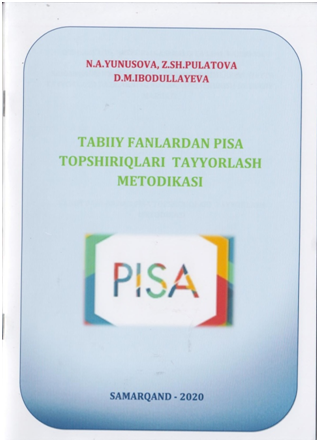 Mamlakatimiz innovatsion taraqqiyot yoʼlida shiddat bilan rivojlanib borayotgan bir davrda kelajagimiz davomchilari boʼlmish yoshlarni ijodiy gʼoyalari va ijodkorligini har tomonlama qoʼllab-quvvatlash, ularning bilim, koʼnikma va malakalarini shakllantirish hamda ilgʼor xorijiy tajribalar, xalqaro mezon va talablar asosida baholash tizimini takomillashtirish, shu yoʼlda xalqaro tajribalarni oʼrganish, mavjud tizimni har tomonlama qiyosiy tahlil qilish, tegishli yoʼnalishdagi xalqaro va xorijiy tashkilotlar, agentliklar, ilmiy-tadqiqot muassasalari bilan yaqindan hamkorlik qilish muhim ahamiyatga egadir.
Mamlakatimiz innovatsion taraqqiyot yoʼlida shiddat bilan rivojlanib borayotgan bir davrda kelajagimiz davomchilari boʼlmish yoshlarni ijodiy gʼoyalari va ijodkorligini har tomonlama qoʼllab-quvvatlash, ularning bilim, koʼnikma va malakalarini shakllantirish hamda ilgʼor xorijiy tajribalar, xalqaro mezon va talablar asosida baholash tizimini takomillashtirish, shu yoʼlda xalqaro tajribalarni oʼrganish, mavjud tizimni har tomonlama qiyosiy tahlil qilish, tegishli yoʼnalishdagi xalqaro va xorijiy tashkilotlar, agentliklar, ilmiy-tadqiqot muassasalari bilan yaqindan hamkorlik qilish muhim ahamiyatga egadir.
Shu maqsadda, Oʼzbekiston Respublikasi Vazirlar Mahkamasining “Xalq taʼlimi tizimida taʼlim sifatini baholash sohasidagi xalqaro tadqiqotlarni tashkil etish chora-tadbirlari toʼgʼrisida” 2018-yil 8-dekabrdagi 997-sonli qarori bilan Oʼzbekiston Respublikasi Vazirlar Mahkamasi huzuridagi Taʼlim sifatini nazorat qilish davlat inspeksiyasi huzurida Taʼlim sifatini baholash boʼyicha xalqaro tadqiqotlarni amalga oshirish Milliy markazi tashkil etildi. Shu bilan birga, taʼlim sifatini baholash boʼyicha xalqaro tadqiqotlarda ishtirok etish vazifalari belgilandi:
PIRLS – boshlangʼich 4-sinf oʼquvchilarining matnni oʼqish va tushunish darajasini baholash;
TIMSS – 4- va 8-sinf o’quvchilarining tabiiy-ilmiy yo’nalishdagi fanlardan savodxonligini baholash;
TALIS – rahbar va pedagog kadrlarning umumiy oʼrta taʼlim muassasalarida oʼqitish va taʼlim olish muhitini hamda oʼqituvchilarning ish sharoitlarini oʼrganish;
PISA – 15 yoshli oʼquvchilarning oʼqish, matematika va tabiiy yoʼnalishdagi fanlardan savodxonlik darajasini baholash.
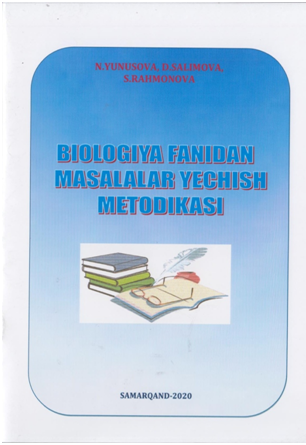 Biologiyadan masalalar va mashqlar yechish o‘quv qo'llanmasida biologiyadan turli hisoblashga doir, eksperimental xususiyatiga ega bo‘Igan masala va mashqlar keltirilgan. Qo‘llanmada keltirilgan masala va mashqlar ayni vaqtda qo‘lla-nilayotgan o‘quv dasturi va ishchi dasturiga mos ravishda ishlab chiqilgan.
Biologiyadan masalalar va mashqlar yechish o‘quv qo'llanmasida biologiyadan turli hisoblashga doir, eksperimental xususiyatiga ega bo‘Igan masala va mashqlar keltirilgan. Qo‘llanmada keltirilgan masala va mashqlar ayni vaqtda qo‘lla-nilayotgan o‘quv dasturi va ishchi dasturiga mos ravishda ishlab chiqilgan.
Biologiyaning turli yo‘nalishlaridan keltirilgan masalalar yechimi biologik qonuniyatlami, tabiat inomlaridan to‘g‘ri foydalanish, alohida hayvon va o‘simliklaming biologiyasi hamda ekologiyasini o‘ziga xos tomonlarini chuqur o‘rganish imkonini beradi Shuningdek qo‘llanmada masalalar sharti, ishlash usullari, yechimlari qisqa holda bayon etilgan va metodik ko‘rsatmalar berilgan. Biologiyadan masalalar yechish o'quvchilaming ilmiy dunyoqarashini, mantiqiy
fikrlashlarini, barcha biologiya kursidan olgan bilimlarini mustahkamlash va rivojlantirish imkonini beradi. Biologiyadan masalalar yecha olish - o‘rta maktab o‘quvchilarinmg amaliy hayotda zarur bo'ladigan eng muhim malakalardan biridir. Ba’zan biologik masalalar degan so‘zdan, asosan genetika mavzulari bo‘yicha yechiladigan masalalar tushuniladi.
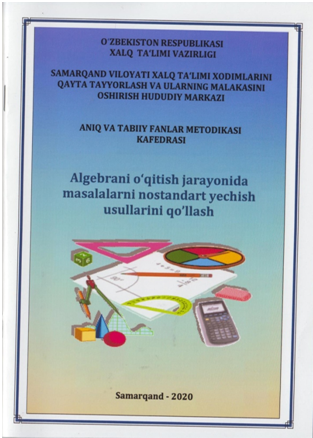 Hozirgi davrda barkamol avlodning ta’lim-tarbiyasi davlat ahamiyatiga molik vazifalardan biridir. Respublikamiz Prezidenti Sh.M.Mirziyoev bu haqda o‘z nutq va asarlarida[1,2,3,4] ta’kidlab, yosh avlodni fan asoslarini chuqur egallashlari va bunda umumta’lim maktablari muhim bosqich sifatida alohida e’tibor qaratilishi zarurligi haqida muhim vazifalarni ilgari surganlar. Shu sababdan matematika o‘qitish usullarini, shu jumladan algebra kursini o‘qitish sifat va samaradorligini oshirish vazifalari muhim ahamiyat kasb etadi. Bunga sabab matematika fanini o‘qitishning maqsad va vazifalariga binoan umumta’lim maktablari o‘quvchilarining matematik bilim va ko‘nikmalarini mustaxkamlash va mantiqiy tafakkurini shakllantirish va bilimlarni amaliyotda qo‘llay olishga o‘rgatishdan iborat bo‘lib, bunda ayniqsa uzlashtirilgan bilim va ko‘nikmalarni o‘quv faoliyatida ijodiy qo‘llash, o‘quvchilarning ijodiy qobiliyatlarini rivojlantirish katta rol o‘ynaydi[15,16,17,19,21,24]. Bu esa algebra kursini o‘qitish usullari va mazmuniga muvofiq holda o‘quvchilarning nostandart matematik masalalarni echa olish ko‘nikmalarini rivojlantirishni, ayniqsa, algebraik tenglama va tengsizliklarni echaolishga o‘rgatish, ularning asosiy echish usullari bilan birga turli echish usullarini shakllantirishni talab etadi. Bunda turli o‘qitish usullari va zamonaviy pedagogik texnologiyalarni qo‘llash muhim ahamiyatga ega.
Hozirgi davrda barkamol avlodning ta’lim-tarbiyasi davlat ahamiyatiga molik vazifalardan biridir. Respublikamiz Prezidenti Sh.M.Mirziyoev bu haqda o‘z nutq va asarlarida[1,2,3,4] ta’kidlab, yosh avlodni fan asoslarini chuqur egallashlari va bunda umumta’lim maktablari muhim bosqich sifatida alohida e’tibor qaratilishi zarurligi haqida muhim vazifalarni ilgari surganlar. Shu sababdan matematika o‘qitish usullarini, shu jumladan algebra kursini o‘qitish sifat va samaradorligini oshirish vazifalari muhim ahamiyat kasb etadi. Bunga sabab matematika fanini o‘qitishning maqsad va vazifalariga binoan umumta’lim maktablari o‘quvchilarining matematik bilim va ko‘nikmalarini mustaxkamlash va mantiqiy tafakkurini shakllantirish va bilimlarni amaliyotda qo‘llay olishga o‘rgatishdan iborat bo‘lib, bunda ayniqsa uzlashtirilgan bilim va ko‘nikmalarni o‘quv faoliyatida ijodiy qo‘llash, o‘quvchilarning ijodiy qobiliyatlarini rivojlantirish katta rol o‘ynaydi[15,16,17,19,21,24]. Bu esa algebra kursini o‘qitish usullari va mazmuniga muvofiq holda o‘quvchilarning nostandart matematik masalalarni echa olish ko‘nikmalarini rivojlantirishni, ayniqsa, algebraik tenglama va tengsizliklarni echaolishga o‘rgatish, ularning asosiy echish usullari bilan birga turli echish usullarini shakllantirishni talab etadi. Bunda turli o‘qitish usullari va zamonaviy pedagogik texnologiyalarni qo‘llash muhim ahamiyatga ega.
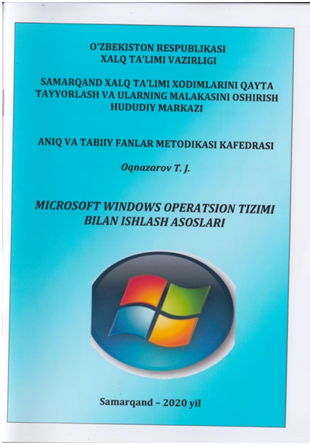 WINDOWS XR OPERATSION SISTEMASI.
WINDOWS XR OPERATSION SISTEMASI.
Umumiy ma’lumotlar. Ekran. Oyna tushunchasi. Sichqoncha bilan bajariladigan amallar.
Operatsion tizim - bu maxsus bir dastur. Bu dastur asosiy vazifasi - kompyuter ishini boshqarish, kompyuter va foydalanuvchi o‘rtasida muloqotni o‘rnatish, tashqi qurilmalar ishlash holatlarini sozlash va ular bilan muloqotni o‘rnatish, har xil dasturlarni ishga tushirish va ular ishlash holatlarini ta’minlash. Operatsion tizimlardan eng taniqlilari bu Mi-crosoft firmasining MS-DOS va Windows dasturlari, Apple firmasining Macintosh dasturi, Unix va Linux dasturlari.
Dunyoning 70% kompyuterlari Microsoft korporatsiyasi tomonidan yaratilgan operatsion tizimlar bilan jihozlangan. Bulardan 1981 yilda yaratilgan - MS-DOS dasturi, 1991 yilda yaratilgan - Windows 3,1 dasturi, 1995 yilda yaratilgan - Windows 95 dasturi, 1998 yilda yaratilgan - Windows 98 dasturi, 2000 yilda yaratilgan - Windows 2000 dasturi, 2001 yilda yaratilgan - Windows Millennium Edition va Windows XP dasturlari. Windows dasturning taniqli bo‘lishining asosiy sababi bu - ish jarayoni soddaligi, ko‘p vazifali rejim, bir xil ishlash interfeysi va boshqa qulayliklar. Boshqa operatsion tizimlarga o‘xshab Windows dasturi ham kompyuter xotirasiga kompyuter yoqilish vaqtda avtomatik ravishda yuklanadi.
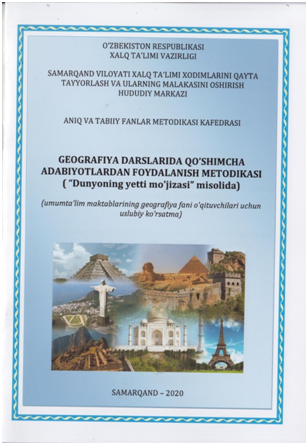 Umumiy o’rta ta’lim maktablarida geografiya ta’limining maqsadi uning fan-texnika taraqqiyotida, ishlab chiqarish sohasida va kundalik hayotda tutgan o’rni bilan belgilanadi. Maktabda geografiya o’qitish va ta’limning umumiy maqsadlariga xizmat qilishi, ya’ni o’quvchilarning ilmiy dunyoqarashi, mantiqiy tafakkur qila olish qobiliyati, aqliy rivojlanishi, o’z-o’zini anglash salohiyatini shakllantirishi va o’stirishi, ularda milliy va umuminsoniy qadriyatlarni tarkib toptirishi hamda ijtimoiy hayotlari va ta’lim olishni davom ettirishlari uchun zarur bo’lgan bilimlarni egallashi lozim.
Umumiy o’rta ta’lim maktablarida geografiya ta’limining maqsadi uning fan-texnika taraqqiyotida, ishlab chiqarish sohasida va kundalik hayotda tutgan o’rni bilan belgilanadi. Maktabda geografiya o’qitish va ta’limning umumiy maqsadlariga xizmat qilishi, ya’ni o’quvchilarning ilmiy dunyoqarashi, mantiqiy tafakkur qila olish qobiliyati, aqliy rivojlanishi, o’z-o’zini anglash salohiyatini shakllantirishi va o’stirishi, ularda milliy va umuminsoniy qadriyatlarni tarkib toptirishi hamda ijtimoiy hayotlari va ta’lim olishni davom ettirishlari uchun zarur bo’lgan bilimlarni egallashi lozim.
Shu bilan birga fanning asosiy vazifasi tabiat va undagi hodisalar, atrofimizdagi olamga nisbatan ijobiy tuyg’ularni shakllantirish, tabiatni qadrlash, muhofaza qilish, o’lka tabiatiga muhabbat hissini uyg’otish, nazariy olgan bilimlarini amalda qo’llash mahoratini, Yer haqidagi ilmiy dunyoqarashlarini shakllantirish, tabiiy, ijtimoiy-iqtisodiy bilimlarni tarkib toptirish, dunyo davlatlari va turli regionlardagi jamiyat va tabiatni o’zaro bog’liqligi, geografik ob’ekt, jarayon va hodisalar haqidagi bilim va tushunchalar bilan qurollantirish, geografik madaniyatni tarbiyalash, Yer yuzining tabiiy manzarasi, tabiatdan oqilona foydalanish, ishlab chiqarish samaradorligini oshirish, aholi turmush darajasini ko’tarish, atrof-muhit holatini yaxshilash vositalari va usullari haqida mantiqiy fikrlashga o’rgatishdan iboratdir.Bugungi kunda mustaqil taraqqiyot yo’lidan borayotgan mamlakatimizning uzluksiz ta’lim tizimini isloh qilish va takomillashtirish, yangi sifat bosqichiga ko’tarish, unga ilg’or pedagogic axborot texnologiyalarni joriy qilish, xamda ta’lim samaradorligini oshirish davlat siyosati darajasiga ko’tarildi.
 Bugungi kunda mustaqil respublikamizda «Kadrlar tayyorlash Milliy dasturi» ni amalga oshirish borasida bir qancha tadbirlar amalga oshirilishi rejalashtirilgan bo‘lib, shulardan biri, kadrlar tayyorlash tizimi va mazmunini mamlakatning ijtimoiy va iqtisodiy istiqbollaridan, jamiyat ehtiyojlaridan, fan, madaniyat, texnika va texnologiyalarning zamonaviy yutuqlaridan kelib chiqqan holda qayta qurishdan iboratdir.
Bugungi kunda mustaqil respublikamizda «Kadrlar tayyorlash Milliy dasturi» ni amalga oshirish borasida bir qancha tadbirlar amalga oshirilishi rejalashtirilgan bo‘lib, shulardan biri, kadrlar tayyorlash tizimi va mazmunini mamlakatning ijtimoiy va iqtisodiy istiqbollaridan, jamiyat ehtiyojlaridan, fan, madaniyat, texnika va texnologiyalarning zamonaviy yutuqlaridan kelib chiqqan holda qayta qurishdan iboratdir.
Ta’lim tizimida har bir fanning o‘qitish mazmunini qayta tahlildan o‘tkazish va uni tubdan isloh qilish nuqtai nazaridan yondashuv zarur bo‘ladi.
Rivojlangan davlatlar tajribasidan shu narsa ma’lumki, bozor iqtisodi sharoitida axborot tizimining qanchalik suratda takomillashuvi davlat tizimining ravnaq topish darajasini belgilashi ma’lum. Shu ma’noda, axborotlarning ishonchliligi, ularning o‘z vaqtida tayyorlanishi ko‘p jihatdan kompyuter dasturchilarning mukammal darajada bilishligiga bog’liq, chunki bu uch vosita bir-biri bilan chambarchas bog’langan holda faoliyat ko‘rsatadi.
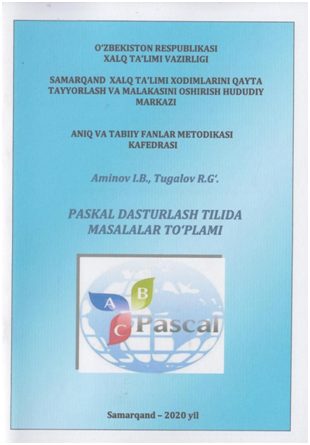 Bugungi kunda mustaqil respublikamizda «Kadrlar tayyorlash Milliy dasturi» ni amalga oshirish borasida bir qancha tadbirlar amalga oshirilishi rejalashtirilgan bo‘lib, shulardan biri, kadrlar tayyorlash tizimi va mazmunini mamlakatning ijtimoiy va iqtisodiy istiqbollaridan, jamiyat ehtiyojlaridan, fan, madaniyat, texnika va texnologiyalarning zamonaviy yutuqlaridan kelib chiqqan holda qayta qurishdan iboratdir.
Bugungi kunda mustaqil respublikamizda «Kadrlar tayyorlash Milliy dasturi» ni amalga oshirish borasida bir qancha tadbirlar amalga oshirilishi rejalashtirilgan bo‘lib, shulardan biri, kadrlar tayyorlash tizimi va mazmunini mamlakatning ijtimoiy va iqtisodiy istiqbollaridan, jamiyat ehtiyojlaridan, fan, madaniyat, texnika va texnologiyalarning zamonaviy yutuqlaridan kelib chiqqan holda qayta qurishdan iboratdir.
Ta’lim tizimida har bir fanning o‘qitish mazmunini qayta tahlildan o‘tkazish va uni tubdan isloh qilish nuqtayi nazaridan yondashuv zarur bo‘ladi. Rivojlangan davlatlar tajribasidan shu narsa ma’lumki, bozor iqtisodi sharoitida axborot tizimining qanchalik suratda takomillashuvi davlat tizimining ravnaq topish darajasini belgilashi ma’lum. Shu ma’noda, axborotlarning ishonchliligi, ularning o‘z vaqtida tayyorlanishi ko‘p jihatdan kompyuter dasturchilarning mukammal darajada bilishligiga bog‘liq, chunki bu uch vosita bir-biri bilan chambarchas bog‘langan holda faoliyat ko‘rsatadi.
Shu narsa quvonchliki, Respublikamizni mustaqillikka erishuvi natijasida hozirgi kunda barcha o‘quvchilar va talabalar zamonaviy kompyuterlardan foydalanish imkoniyatiga ega bo‘ldilar. Shu bois ham, “Informatika va axborot texnologiyalari” fani barcha o‘quv yurtlarida o‘qitiladigan kompyuter savodxonligi borasidagi uzluksiz dastur tizimiga kiritilgan Davlat ta’lim konsepsiyasiga asoslanadi.
 Mustaqillik O‘zbekistonning birinchi prezidenti I.Karimov tomonidan e’lon qilgan davrdan boshlab, boshqa sohalar kabi ta’lim sohasida ham ulkan islohotlar amalga oshirildi. Bunday islohotlardan asosiysi O‘zbekiston Respublikasi “Kadrlar Tayyorlash Milliy Dasturi” va “Ta’lim to‘gʻrisidagi qonun”ning qabul qilinishidir.Bunga muvofiq yosh avlodga ta’lim - tarbiya berish, barkamol avlodni tarbiyalash ma’suliyati davlat siyosati darajasiga ko‘tarildi. Bu ma’sulyatli vazifani amalga oshirishda ajdodlarimiz qoldirgan matematik merosdan foydalanish va ular bilan yosh avlodni tanishtirish,xabardor qilish maqsadga muvofiqdir. Ajdodlarimiz Al Xorazmiy,Abu Rayxon Beruniy, Abu Nasr Forobiy,Ulugʻbek va uning ilmiy maktabi vakillari Qozizoda Rumiy,Jamshd Al Koshiy hayoti va ijodi hamda ularning matematika faniga qo‘shgan hissasi, ularning yozgan asarlaridan foydalanish, o‘quvchi va talabalarning matematik bilimlarini oshirishga, matematika faniga qiziqishlarini oshirishga muhim kasb etadi. Bu malakaviy bitiruv ishi Mirzo Ulugʻbek ilmiy maktabi va uning jahon matematikasini rivojlantirishga qo‘shgan hissasiga bagʻishlanadi.
Mustaqillik O‘zbekistonning birinchi prezidenti I.Karimov tomonidan e’lon qilgan davrdan boshlab, boshqa sohalar kabi ta’lim sohasida ham ulkan islohotlar amalga oshirildi. Bunday islohotlardan asosiysi O‘zbekiston Respublikasi “Kadrlar Tayyorlash Milliy Dasturi” va “Ta’lim to‘gʻrisidagi qonun”ning qabul qilinishidir.Bunga muvofiq yosh avlodga ta’lim - tarbiya berish, barkamol avlodni tarbiyalash ma’suliyati davlat siyosati darajasiga ko‘tarildi. Bu ma’sulyatli vazifani amalga oshirishda ajdodlarimiz qoldirgan matematik merosdan foydalanish va ular bilan yosh avlodni tanishtirish,xabardor qilish maqsadga muvofiqdir. Ajdodlarimiz Al Xorazmiy,Abu Rayxon Beruniy, Abu Nasr Forobiy,Ulugʻbek va uning ilmiy maktabi vakillari Qozizoda Rumiy,Jamshd Al Koshiy hayoti va ijodi hamda ularning matematika faniga qo‘shgan hissasi, ularning yozgan asarlaridan foydalanish, o‘quvchi va talabalarning matematik bilimlarini oshirishga, matematika faniga qiziqishlarini oshirishga muhim kasb etadi. Bu malakaviy bitiruv ishi Mirzo Ulugʻbek ilmiy maktabi va uning jahon matematikasini rivojlantirishga qo‘shgan hissasiga bagʻishlanadi.







